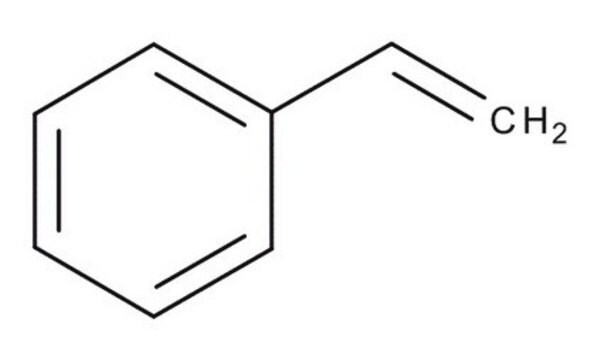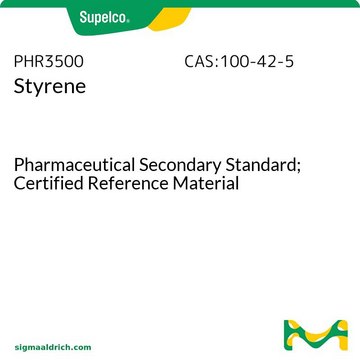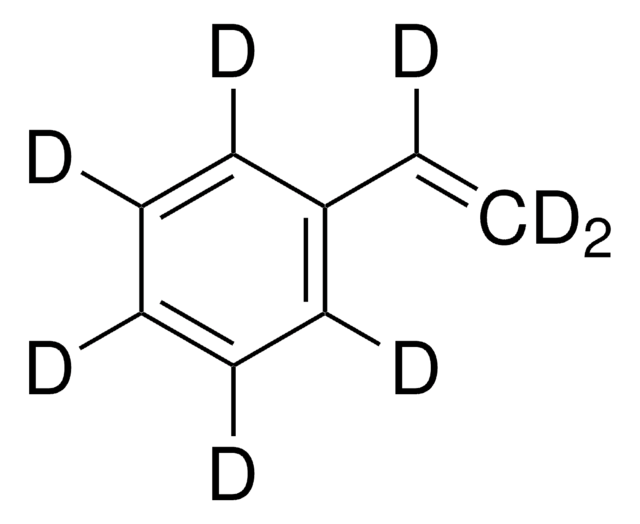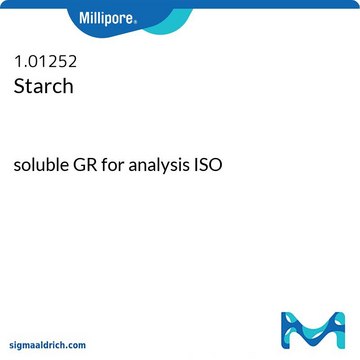47745-U
Styrene
analytical standard
Synonym(s):
Phenylethylene, Vinylbenzene
About This Item
Recommended Products
grade
analytical standard
vapor density
3.6 (vs air)
vapor pressure
12.4 mmHg ( 37.7 °C)
4.3 mmHg ( 15 °C)
CofA
current certificate can be downloaded
autoignition temp.
914 °F
expl. lim.
6.1 %
packaging
ampule of 1000 mg
technique(s)
HPLC: suitable
gas chromatography (GC): suitable
refractive index
n20/D 1.546 (lit.)
bp
145-146 °C (lit.)
mp
−31 °C (lit.)
density
0.906 g/mL at 25 °C
application(s)
environmental
format
neat
storage temp.
2-8°C
SMILES string
C=Cc1ccccc1
InChI
1S/C8H8/c1-2-8-6-4-3-5-7-8/h2-7H,1H2
InChI key
PPBRXRYQALVLMV-UHFFFAOYSA-N
Looking for similar products? Visit Product Comparison Guide
General description
Application
Other Notes
signalword
Danger
Hazard Classifications
Acute Tox. 4 Inhalation - Aquatic Chronic 3 - Asp. Tox. 1 - Eye Irrit. 2 - Flam. Liq. 3 - Repr. 2 - Skin Irrit. 2 - STOT RE 1 Inhalation - STOT SE 3
target_organs
hearing organs, Respiratory system
Storage Class
3 - Flammable liquids
wgk_germany
WGK 2
flash_point_f
89.6 °F - closed cup
flash_point_c
32.0 °C - closed cup
ppe
Eyeshields, Faceshields, Gloves, type ABEK (EN14387) respirator filter
Choose from one of the most recent versions:
Already Own This Product?
Find documentation for the products that you have recently purchased in the Document Library.
Protocols
GC Analysis of Xylene Isomers on SLB®-IL60 - The cresol (methylphenol) isomers are also precursors to many chemicals. This chromatogram of a mix of aromatic and methylphenol compounds was generated using an SLB-IL60 ionic liquid column. Its interaction mechanisms allow the separation of all three xylene isomers, and all three cresol isomers.
US EPA Method TO-17: GC Analysis of Volatiles on VOCOL® after Collection/Desorption using Air Toxics Tube
US EPA Method 8260 describes the analysis of volatile organic compounds in solid wastes and ground waters. This application illustrates the analysis of many compounds commonly analyzed by this method using purge and trap coupled to GC-MS.
Our team of scientists has experience in all areas of research including Life Science, Material Science, Chemical Synthesis, Chromatography, Analytical and many others.
Contact Technical Service









